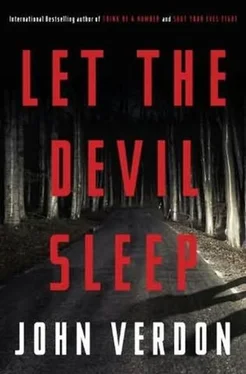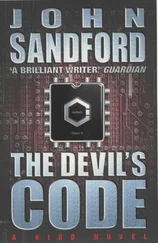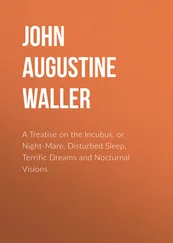Holdenfield raised her right hand in the traditional traffic-cop “Stop” gesture. “Could I make a suggestion here? Could we take this down a notch? We’re here to discuss facts, evidence, reasonable interpretations. The emotional component is getting in the way. Maybe we could just-”
“You’re absolutely right,” said Trout with a tight smile. “I think we should let Mr. Gurney-Dave-have his say, put everything on the table. If there’s a problem with our interpretation of the evidence, let’s get to the bottom of it. Dave? I’m sure you have more to tell us. Please go ahead.”
Trout’s eagerness to get him to incriminate himself with a prosecutable admission of receiving stolen files was so transparent that Gurney came close to laughing in the man’s face.
Trout added, “Maybe for the past ten years I’ve been too close to all of this. You’re coming at it with fresh eyes. Tell me, what am I missing?”
“How about the fact that you’ve built a very big hypothesis on very few data points?”
“That’s what the art of constructing an investigative premise is all about.”
“It’s also what schizophrenic delusions are all about.”
“Dave…” Holdenfield’s cautionary hand rose from her lap.
“Sorry. My concern is that the case study that’s become enshrined in the annals of contemporary psych is just a giant circle dance. The manifesto, the details of the shootings, the offender profile, media mythmaking, popular imagination, and academic theorizing have all been contributing to the story-shaping it, polishing it, turning it into unassailable truth. Problem is, there’s nothing solid to support this unassailable truth.”
“Except, of course,” said Holdenfield sharply, “the first two items you mentioned, which are very solid indeed-the manifesto and the details of the shootings.”
“But suppose the details and the manifesto were specifically designed to reflect and reinforce each other? Suppose the killer is twice as smart as anyone thinks he is? Suppose he’s been laughing his ass off at Agent Trout’s team for the past ten years?”
Trout’s eyes hardened. “You mentioned that you’d read the profile?”
Gurney grinned. “Which sounds to you like more proof of illegal access to precious files? Actually, that’s not what I said. I referred to the profile, but I didn’t say I’d read it. Let me just speculate for a minute. I bet the profile tries to explain how the killer is both efficient and inefficient, stable and crazy, atheistic and biblical. How am I doing?”
Trout sighed impatiently. “No comment.”
“The problem is, you accepted the killer’s manifesto as a legitimate expression of his thinking-because it confirmed your own thinking. It validated the ideas you were already forming about the case. It never occurred to you that the manifesto was a charade, that you were being played for fools. The Good Shepherd was telling you your conclusions were right. So of course you believed him.”
Trout shook his head in a bad imitation of sad resignation. “I’m afraid we’re on different planets here. I’d have thought from your background that we’d be on the same side.”
“Nice thought. Bit out of touch with reality.”
The head shaking continued. “The FBI goal with the Good Shepherd case-as it is with every case, and as it should be with every honest law-enforcement officer on every case-is to discover the truth. If we shared the integrity of our profession, then we’d be on the same side.”
“You believe that?”
“It’s the foundation of everything we do.”
“Look, Trout, I’ve been around as long as you have, maybe longer. You’re talking to a cop, not the goddamn Rotary Club. Sure, the goal is to discover the truth-except when another goal gets in the way. In most cases we don’t get to the truth. What we get to, if we’re lucky, is a satisfactory conclusion. We get to a credible way of characterizing something. We get to a way of convicting someone. You know damn well that the real-world structure of police agencies doesn’t reward the pursuit of truth and justice. It rewards satisfactory conclusions. The goal in the heart of an individual cop may be to get to the truth. But the goal he’s rewarded for is clearing the case. Hand the DA’s office a perp to prosecute, preferably with a coherent narrative of fact and motive, best of all with a signed confession-that’s the real game.”
Trout rolled his eyes and looked at his watch.
“The point is,” said Gurney, leaning forward, “you had a coherent narrative. In a way you had a signed confession-the manifesto. Of course, the fly in the ointment was the elusiveness of the perp. But what the hell. You came up with your offender profile. You had his detailed statement of intent. You had six murders that were consistent with what you and your Behavioral Analysis Unit knew about the Good Shepherd. Solid work, logical conclusions. Coherent, professional, defensible.”
“What, precisely, is your problem with that?”
“Unless you have evidence you haven’t revealed, everything you think you know is based on fiction. I’m hoping, by the way, that I’m wrong. Tell me you’ve got stuff in your files that nobody knows about.”
“You’re not making sense, Gurney. And I’m out of time. So if you don’t mind-”
“Ask yourself two questions, Trout. First, what other theory of the case might you have developed if you’d never received the manifesto? Second, what if every word of that precious document is bullshit?”
“Interesting questions, I’m sure. Let me ask you one before you leave.” The steepled hands returned to his chin. It was a professorial pose. “Considering your lack of any official standing or any basis for being involved in this in any way… where does all this hostile theorizing take you, other than into a world of trouble?”
Perhaps it was the threat in Trout’s gaze. Or the smirk on Daker’s lips as he leaned against the doorpost. Or the nettling reminder of his own lack of a badge. Whatever the root of the impulse, it pushed Gurney to say something he hadn’t planned to say.
“It may force me to accept an offer I hadn’t considered seriously until now. An opportunity at RAM News. They want to build a program segment around me.”
“Around you ?”
“Yes. Or my image. Using my arrest statistics.”
Trout glanced curiously at Daker, who shrugged but said nothing.
“They seem to be overly impressed by the fact that I had the highest homicide-clearing rate in the history of the department.”
Trout’s mouth opened, but he closed it again without speaking.
“They want me to review famous unsolved cases and offer my opinion on where I think the investigations went off the tracks. Starting with the Good Shepherd case. They plan to call the series In the Absence of Justice . Catchy, eh?”
Trout examined his steepled fingers for a long minute, concluding with another sad shake of his head. “Everything keeps bringing me back to the problem of leaked documents, unauthorized access, transmission of confidential information, violations of regulations, violations of federal and state laws. Endless unpleasant complications.”
“Small price to pay. After all, as you said before, the main thing is justice. Or was it truth? Something like that, right?”
Trout gave him a cold stare and repeated with slow emphasis, “Endless… unpleasant… complications.” His gaze traveled to the mounted wildcats on the mantel. “Not such a small price. Not something I’d want to be in your shoes for. Especially not right now. Not on top of having to deal with that arson business.”
“Excuse me?”
“I heard about your barn.”
Читать дальше












